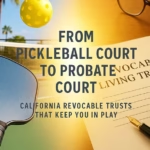
From Pickleball Court to Probate Court: How a Revocable Trust Keeps You Out of Trouble in California
August 13, 2025
Can a Postnuptial Agreement Protect You from Your Spouse’s Liability in California?
September 8, 2025What If Marriage Equality Is Challenged? Estate Planning Strategies for LGBTQ Couples in California

For many LGBTQ couples, the legal recognition of marriage brought not only dignity and equality but also critical protections around property, inheritance, and decision-making. At the Kushner Legal Corporation, we have been counseling many concerned couples in recent weeks who are navigating the stress from today’s political climate, where some worry that marriage equality at the federal level could be challenged or even rolled back in the future
While California law provides strong protections for same-sex couples, the possibility of shifting federal interpretations makes estate planning more important than ever. A carefully crafted estate plan ensures that your rights, and your spouse’s rights remain secure no matter what changes may come.
Why LGBTQ Couples Should Be Concerned
The 2015 U.S. Supreme Court case Obergefell v. Hodges established marriage equality nationwide. But subsequent rulings have raised questions about whether other landmark decisions could be revisited. If federal protections for same-sex marriage were weakened, recognition could again fall to individual states.
Fortunately, California has codified marriage equality into state law. Still, estate planning isn’t only about what happens under today’s laws, it’s about preparing for tomorrow’s uncertainties. Without proper documents in place, LGBTQ couples may face unnecessary legal hurdles if hostile jurisdictions or federal agencies refuse recognition in the future.
Key Estate Planning Tools for LGBTQ Married Couples
Revocable Living Trust
A revocable living trust allows couples to control how property passes without court involvement. It ensures:
- Assets transfer directly to a surviving spouse without probate delays.
- Privacy is maintained, as trusts are not public like wills.
- Recognition of spousal status in case federal or interstate disputes arise.
- Since California’s probate process is lengthy and expensive, LGBTQ couples should strongly consider a trust as their estate’s foundation.
Pour-Over Will
Even with a trust, a will remains critical. A pour-over will directs any assets not already in the trust to be transferred into it at death. This ensures consistency and reduces the risk of disputes from family members who may not support the marriage.
Advance Health Care Directive
If one spouse becomes incapacitated, California law gives priority to a legally married partner in making health care decisions. But having an Advance Health Care Directive makes your wishes undeniable—especially if you encounter a hospital in a state less supportive of LGBTQ rights.
This document:
- Names your spouse (or another trusted person) as your health care agent.
- Outlines end-of-life care preferences.
- Reduces the risk of family conflict in medical emergencies.
Durable Power of Attorney
This document authorizes your spouse to manage financial and legal matters if you become incapacitated. Without it, your spouse may need to petition the court for conservatorship—a costly, stressful process.
A well-drafted power of attorney provides immediate authority, ensuring continuity in paying bills, managing accounts, or handling property transactions.
Beneficiary Designations
Certain assets—such as retirement accounts, life insurance, or bank accounts—pass directly through beneficiary designations, not your will or trust. Always double-check that your spouse is listed as the primary beneficiary. This provides additional protection if marriage recognition were ever questioned at a federal level.
California Protections vs. Federal Risks
Even if federal recognition of same-sex marriage were curtailed, California would continue honoring LGBTQ marriages under state law. That means:
- Community property rules would still apply (California Family Code §760).
- Spousal inheritance rights would remain protected (California Probate Code §§6400–6414).
- State tax law would treat married same-sex couples the same as any other couple.
But risks could arise with federal benefits and interstate recognition. For example:
- A surviving spouse’s eligibility for Social Security survivor benefits could be challenged if federal protections weaken.
- If you own property in another state less protective of LGBTQ rights, transfer of ownership could be contested.
- Health care decisions or inheritance issues could become more complicated if one spouse is hospitalized or passes away outside California.
Taking Proactive Steps Now
The best defense against legal uncertainty is a comprehensive estate plan. LGBTQ couples should consider:
- Reviewing existing estate plans every 2–3 years to ensure they reflect current laws and personal wishes.
- Funding trusts properly by retitling assets into the trust’s name.
- Updating beneficiary designations regularly, especially after marriage, property acquisitions, or life events.
- Consulting an estate planning attorney who is sensitive to LGBTQ issues and aware of both California and federal legal landscapes.
Final Thoughts
Estate planning is about control, dignity, and protecting the people you love. For LGBTQ couples, it is also about resilience in the face of political and legal uncertainty. By creating a robust plan including trusts, wills, advance directives, and powers of attorney, you safeguard your marriage, your property, and your legacy, regardless of what happens at the federal level.
California law already offers strong support, but with the right estate plan, you can rest assured knowing that your rights as a couple are preserved across jurisdictions and through every stage of life.
Contact the Kushner Legal Corporation today to schedule a complimentary 30 minute consultation.



